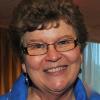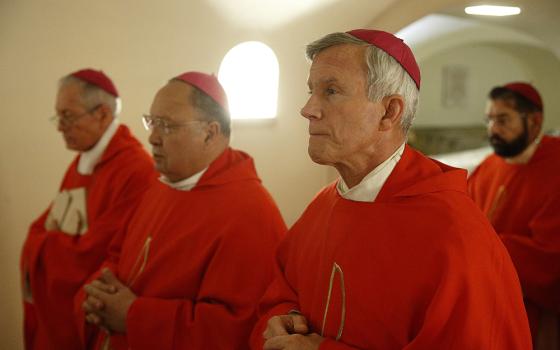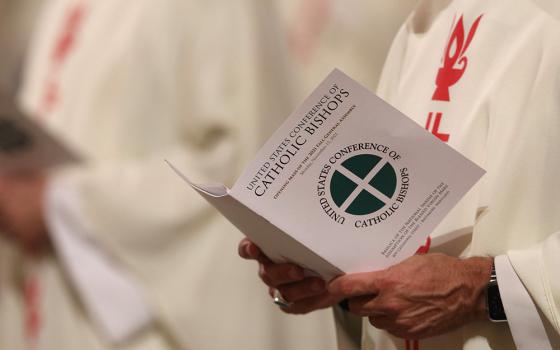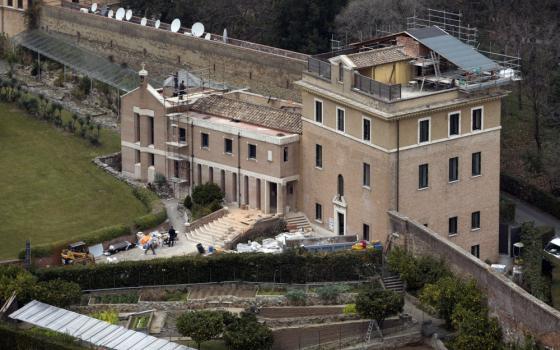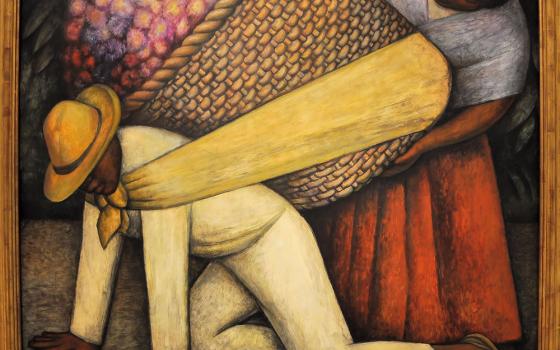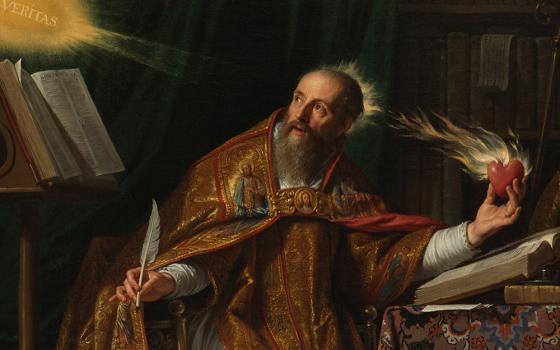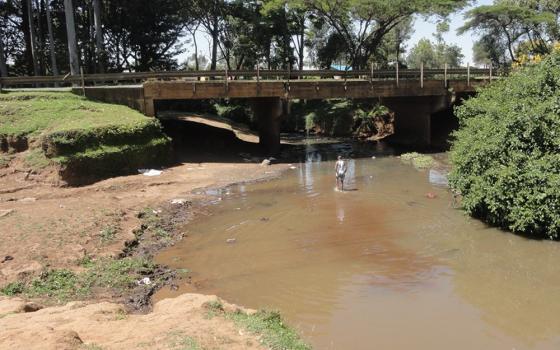 RESIZE.jpg)
(Wikimedia Commons/Erik Drost)
My home diocese of Cleveland has the unfortunate distinction of being among the most recent of a distressingly long line of dioceses to issue policies that are harmful to LGBTQ young people and their families. On Aug. 30, the diocese promulgated as "particular law" a new "Parish and School Policy on Issues of Sexuality and Gender Identity."
While not denying LGBTQ youth entrance to diocesan schools, the directives essentially forbid any expression of their identities. They ban LGBTQ pride expression and the use of gender-inclusive pronouns and gender-affirming health care. They require the use of bathrooms and clothing consistent with a person's biological sex. Parish and school staff members are mandated to tell parents if a child has confided that they may be transgender.
The policy affects some 40,000 students in five diocesan high schools and 79 elementary schools. It applies "to all offices, parishes, parish schools, and diocesan schools ... as well as their employees, personnel, volunteers, students, and youth participating in parish or institutional faith formation."
Public outcry was immediate. The LGBT center of Greater Cleveland described it as "dangerous" to LGBT youth and a "massive setback," to creating an inclusive community.
Political leaders strenuously objected: "As a Christian, the diocese's policy is a shocking betrayal of the church teachings that have shaped who I am today," said Cleveland's mayor, Justin Bibb. "The new policy forces LGBTQ kids to hide their authentic selves and attend school in fear of persecution for who they are."
 RESIZE.jpg?itok=2-wTeumh)
A view of the interior of St. John the Evangelist Cathedral in Cleveland (Wikimedia Commons/Tim Evanson)
Councilman Kerry McCormack wrote, "I attended [diocesan] schools. I had many wonderful teachers who taught me about an all-loving God. ... This politically motivated decision will harm young people in our local parochial schools and continue to alienate the church."
Regina Brett, a former Catholic and retired columnist for the Cleveland Plain Dealer who often wrote about her faith, gave this scathing critique: "This new policy is another form of spiritual abuse. The Church is creating new ways to shame, scare and control people. A church should be a refuge from all this hate and fear. It's the opposite. No, I didn't leave the Church. The Church left me. And it just gave everyone else more reasons to leave."
Cleveland is among the most Catholic of cities, with Catholicism being the most common religion (28.6% of residents) in Cuyahoga County, where the diocese is located.
I am beyond grateful that this regressive new policy does not apply to the 14 Catholic high schools run by religious orders, including St. Joseph Academy, a sponsored ministry of my own Congregation of St. Joseph. After consulting with board members, academy leadership quickly sent a letter to parents describing the school's intent to continue engaging LGBTQ students based "on the principles of unifying love and concern for the well-being of our students, in partnership with parents/guardians."
Noting that the school is "guided by the commitments of the Congregation of St. Joseph on this matter" school leadership explicitly cited my congregation's public commitment to being allies of the LGBTQ community. Several other Cleveland religious order schools responded in a similar vein.
In my 30-plus years of being a Catholic nun, I have rarely been more proud and grateful to be a Sister of St. Joseph.
About 10 years ago, my congregation began to discern how we are called to accompany our LGBTQ sisters and brothers. We spent considerable time learning about recent scientific understandings of human sexuality and the many ways LGBTQ sexuality manifests and expresses itself in our human family.
School leadership cited my congregation's public commitment to being allies of the LGBTQ community. In my 30-plus years of being a Catholic nun, I have rarely been more proud and grateful to be a Sister of St. Joseph.
We learned about pronouns, yes, but mostly we learned about the people who find themselves persecuted and marginalized because of their God-given embodiment. We learned startling statistics about the incidence of suicide attempts or self-harm among LGBTQ youth and adults.
We chose to be allies of our LGBTQ sisters and brothers because our charism impels us to live the truth that love of God and love of neighbor are one. As a result, we have become engaged in an array of activities, from attending Pride festivals and parades to joining with Catholic bishops supporting the Tyler Clementi Foundation standing with at-risk LGBT youth in our country.
One of the most distressing aspects of the spate of anti-LGBTQ policies being issued by Catholic dioceses is the repeated assumption that all humans are born either male or female and one's gender identity must be consistent with one's "God-given biological sex." Genesis 1:27 is often cited.
It isn't that simple.
Consider that 1.7% of babies born in the U.S. have intersex traits which can occur both internally and externally, according to the organization InterACT. Are intersex people also created by God?
Then there are transgender people, whose gender identity is different from the one they were assumed to be at birth based on genitalia alone. A Pew Research Center survey estimated them to be 1.6% of the U.S. population. Trans and intersex individuals are not the same. (Remember I said this is not simple — it is complicated!)
What isn't complicated is that the theology used by Catholic church leadership assumes that human beings are either male or female, and never the twain shall meet. Contemporary science says otherwise. An in-depth 2019 article from Scientific American summarizes extensive research findings that "sex is anything but binary" and concludes: "Transgender humans represent the complexity and diversity that are fundamental features of life, evolution and nature itself. That is a fact."
Advertisement
Aaron Demlow, a 25-year-old trans man and former Catholic, describes what our failure to celebrate complexity and diversity means: "Jesus would be kind of offended that his children, that he created in his image, are being stifled and that their colors are being grayed out and stamped out and forced to fit in these two rigid boxes. I feel like this is a slap in the face to his creation."
It is not within my scope here to wade any deeper into the weeds of contemporary science and recalcitrant religion, but rather to lament Catholic bishops who refuse to consider the scientific data and the experiences of faithful LGBTQ Catholics and their allies.
I appreciate how hard it can be to adjust one's worldview. Which is exactly why diocesan leadership must stop creating policy from within their comfortable bubbles.
They must consult with those who know something about the real live people who are most affected and most likely to be harmed. How many LGBTQ people were invited to help create the Cleveland policy? Were any health care personnel — say, psychologists and physicians who regularly treat LGBT folk — invited to participate?
Apparently, the diocese did not even invite the views of Catholic high schools. KC McKenna, the president of St. Edward High School, which is sponsored by the Congregation of Holy Cross, said the school was unaware of and had not been consulted about the directives.
This is a really bad way to develop policy — especially in a time of synodality with a pope who is passionate about including everyone. I wish that the Cleveland Diocese — indeed, all U.S. dioceses — would imitate the far more enlightened guidelines recently issued by the Diocese of Davenport, Iowa, after widespread consultation.
I grieve for the hurt the Cleveland policy brings to our LGBTQ young people. They deserve so much better.
